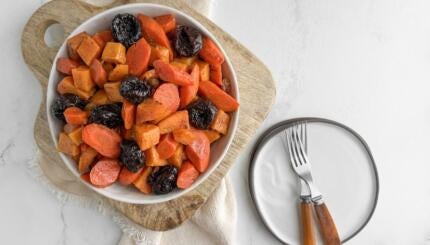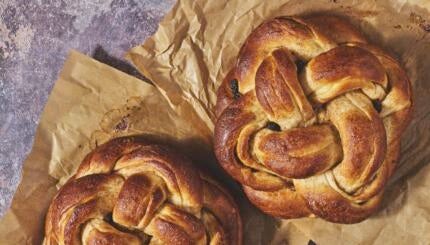For more on Southern Jewish life, check out MyJewishLearning’s Southern & Jewish blog.
What makes Southern Jews, Southern Jews? According to one historian, all you need do is take a look at their food. Jews in the South have always used food to negotiate and express their identities. As Marcie Cohen Ferris explains in, Matzoh Ball Gumbo: Culinary Tales of the Jewish South, Jews, historically neither white nor Black navigated the racial politics and the culinary traditions that they developed to express their unique position as Southern Jews. Take for example, Sweet and Sour Salami, which I’ve seen nowhere else, but eaten often since arriving in Atlanta. So it should have come as no surprise, that there is a Kosher BBQ Festival in Atlanta. And for this Canadian-Israeli new arrival to the United States with only a conceptual idea of BBQ, the experience was quite a revelation.
READ: Meet ‘RaBBi-Q,’ Kansas City’s Kosher BBQ Star
My first, and admittedly only thought, when learning of the BBQ festival from Matthew Dickson, one of the organizers and a competitor, was of the meat. Keeping kosher has meant that exploring local cuisines as I’ve moved around has been limited to vegetarian options – or as was the case in living Munich spending a great deal proving my Jewishness to the kosher butcher so I could make an appointment to buy Weisswurst. I longed to try slow cooked brisket and beef ribs.
I was not disappointed. Though I was warned that sample size would be small, I ate more than a reasonable portion of BBQ. Some was too spicy or too tough or too mushy. But there were also bites that were transcendent. And thanks to a little coaching by Dickson, who was touting his own, I learned that the burnt ends were choice morsels not to be missed.
But to my surprise and delight, what began with a lesson on food, taught me a great deal more about this new community that I recently came to call home.
READ: Learning to Cook in My Southern Jewish Kitchen
Learning of my passion for Jewish food, the Hebrew Order of David roped me in to judge, the booths at the festival, to assess their themes, their names and their Jewish spirit. There was a range of approaches to the booths. Some took their presentation super seriously like the Brisketeers dressed in Renaissance tunics announcing visitors with the call of a shofar or the Grillin Tefillin with their ‘Kosher Klink’ and cowboy hats. There were also those booths that were minimalist, which as one competitor, unsuccessfully, tried to convince me is a very Jewish approach to life.
But it was in the less elaborate but thoughtfully decorated booths that I found new understanding about Jewish life in the South. The folks from Temple Sinai, a Reform congregation, did a lovely job providing a touch of Western flair with blue and red bandanas, but beyond the kosher meat, their candy basket was studded with the flags of both Israel and the United States — fully Southern, American and Jewish. Another team had a TV hooked up, explaining to me that in their minds one can’t separate football from BBQ. The details of everyday BBQ on show.
The range of teams showcased the diversity of organizations and institutions that come together to make the Jewish community function. There were numerous synagogues of a variety of denominations. There was the Dressler’s Jewish funeral home and the Atlanta Jewish Times. There were even Northern Jews from New England showing BBQ/Jewish solidarity knows no bounds. But in truth the Jewish community has never been completely separate from the broader communities in which it has found itself, and this competition was no exception. The local police and firefighters each sent a team. And while there was a Jewish firefighter in the mix, the police were up for their first kosher experience, which was tough because, as their representative explained, he “is a pork guy.” Given event sponsorship by the Hebrew Order of David, a Jewish civic service organization, giving to others was also a feature, with a strong push to donate to the local food bank even as we enjoyed more than we needed to eat.
I doubt most of the competitors or the visitors were aware of the history or deeper meanings of BBQ as either Southern or Jewish traditions. As culinary historian Michael “Kosher Soul” Twitty has written, the BBQ has now become a staple of American cooking owes a tremendous debt to the Africans who were brought to the United States as slaves across the South. And before the destruction of the Holy Temple in Jerusalem, prayer was directly connected with the offerings of cooked meat. But whether they were aware or not, in staying up all night, cooking for the judges and the crowd, the participants in this year’s Atlanta Kosher BBQ festival, did a great job showcasing modern Jewish Southern identity.
kosher
Pronounced: KOH-sher, Origin: Hebrew, adhering to kashrut, the traditional Jewish dietary laws.
shofar
Pronounced: sho-FAR or SHO-far, Origin: Hebrew, a ram’s horn that is sounded during the month of Elul, on Rosh Hashanah, and on Yom Kippur. It is mentioned numerous times in the Bible, in reference to its ceremonial use in the Temple and to its function as a signal-horn of war.



